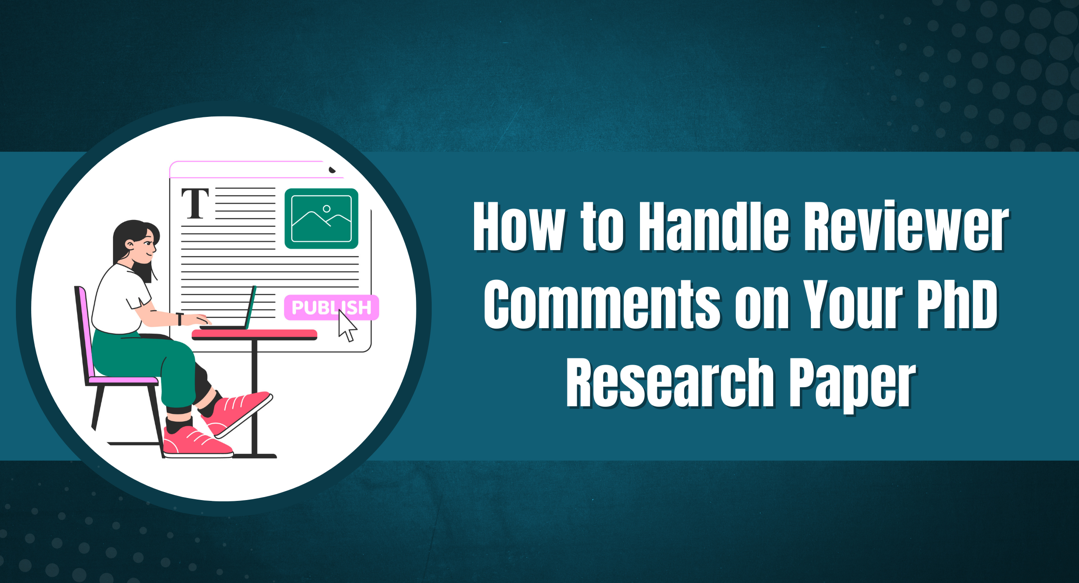08Apr

Publishing a PhD research paper in a reputed journal is one of the most important milestones in an academic journey. After months or even years of data collection, analysis, and writing, submitting the manuscript feels like reaching the finish line. But just when you feel a sense of accomplishment, the reviewer comments arrive—and they can sometimes feel like a punch to the gut.
But here’s the truth: reviewer comments are not rejection—they are opportunities. Understanding how to respond effectively and professionally to reviewer feedback is essential for getting your paper published. In this comprehensive guide, we will walk you through a step-by-step process on how to handle reviewer comments on your PhD research paper.

Reviewer feedback is a fundamental part of the peer review process, the gold standard in academic publishing. These comments are meant to enhance the quality, clarity, and validity of your work. They help you:
Although receiving criticism can be disheartening, especially after extensive hard work, responding constructively to reviewer comments often makes the difference between rejection and successful publication.
Reviewer comments generally fall into the following categories:
These may involve:
These are less critical and typically include:
These focus on the paper’s structure, formatting, tone, and presentation according to journal guidelines.
Each comment, whether minor or major, deserves your attention and a detailed response.
When you receive the reviewer comments, take a deep breath. It’s natural to feel defensive, especially if the feedback seems harsh or misguided. Instead of reacting emotionally:
Re-reading the comments later often provides clarity and helps you distinguish constructive criticism from misunderstandings.
Print the reviewer comments or copy them into a document. Break them down point by point. For each comment, ask yourself:
Pro tip: If there are multiple reviewers, check for contradictions between them. If one suggests something that conflicts with another, note that—it will be important later.
Create a “Response to Reviewers” document using this format:
Be clear, polite, and professional. If a reviewer misunderstood something, revise that part of the manuscript to avoid future misinterpretations.
Open your manuscript and make the necessary changes. As you go:
Ensure consistency across the manuscript. For example, if you modify your research question or data interpretation, verify that all related sections are updated.
Not all reviewer suggestions are valid or feasible. If you genuiney disagree with a comment:
Example:
Comment: “Consider using a qualitative approach instead of a survey.”
Response: “We appreciate the reviewer’s suggestion. However, the objective of the study was to quantify behavioral patterns using statistical analysis, which aligns more appropriately with a survey method. We have added a clarification in the methodology section to reflect this.”
Always maintain a respectful and appreciative tone.
After addressing all comments
Ask a colleague or mentor to review your revised version before resubmitting.
Along with the revised manuscript and response document, write a professional cover letter to the journal editor. This letter should:
Sample Cover Letter Snippet:
Dear Editor,
Thank you for the valuable feedback provided by you and the reviewers. We have carefully considered all comments and revised the manuscript accordingly. A detailed response to each reviewer comment is attached. We believe the revised version is significantly improved and look forward to your favorable consideration.
Rejection doesn’t mean your research is worthless. Many successful papers were rejected multiple times before acceptance. Here’s what to do:
Persistence is key in academic publishing.
Handling reviewer comments is a vital skill for any researcher or academic. Your ability to accept criticism, respond thoughtfully, and revise professionally can determine your success in the world of scholarly publishing. Every revision of your PhD Research Paper brings you closer to your goal—not just of publication, but of producing high-quality, credible, and impactful research. Take the feedback as a learning tool, and use it to grow as a scholar and strengthen your PhD Research Paper.
Kenfra Research understands the challenges faced by PhD scholars and offers tailored solutions to support your academic goals. From topic selection to advanced plagiarism checking.

The fear of PhD thesis rejection is a common yet deeply unsettling experience for many doctoral candidates. After years... read more

Rejection is a silent companion throughout your PhD journey. From declined journal submissions and fellowship denials to critical supervisor... read more

Completing a PhD thesis is a monumental task. It’s not just about writing; it’s about writing well, writing consistently,... read more
Hit Delhi University students to get another shot at exams Introduction:The decision to allow Delhi University students another opportunity to take... read more

Embarking on an academic journey often involves encountering terms like Thesis and Dissertation, which are sometimes used interchangeably. However,... read more
Unrest peaks in Wardha univ, students move HC Wardha University:Wardha University, formally known as the Mahatma Gandhi Antarrashtriya Hindi Vishwavidyalaya (MGAHV),... read more
WhatsApp us
Leave a Reply